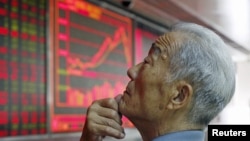World markets tumbled Monday after the main Chinese stock market suffered its biggest plunge in eight years.
European markets dropped to two-week lows, and U.S. indices were down for the fifth straight session.
Serious setback
The Chinese government’s dramatic efforts to prop up the mainland’s falling stock markets suffered a serious setback Monday as major indexes suffered their biggest single-day plunge in eight years.
The Shanghai Composite index lost 8.5 percent, while the CSI300 index of the largest listed companies in Shanghai and Shenzhen shed 8.6 percent.
Some analysts attributed the selloffs to investors’ profit-taking following the government’s massive capital support, which succeeded in bolstering shares over the past three weeks.
Others say the markets react negatively to news that the International Monetary Fund was reportedly pushing China to unwind its intervention, as well as worse-than-expected data on profit at Chinese industrial firms, and rising pork prices.
But the main reason is that the Chinese stock markets are not done de-leveraging, says Raymond Yeung, senior economist of Greater China at the Australia and New Zealand Banking Group.
“Because of the high, still high leverage exposure of the Chinese markets, anything that triggers a decline in such a short time will see some negative spiral effects in such highly leveraged markets,” Yeung says.
Margin lending issues
As China’s mainland stock markets rose over the past year, many investors borrowed money to buy stocks, in what is known as margin lending. But as markets have fallen, many investors could struggle to pay back the loans.
Going forward, Yeung thus expects Chinese stock regulators to continue restricting such practices, which he says will contribute to the market’s health.
Beijing has taken extensive measures to try to ensure the markets do not fall, freezing trading in many stocks, using the central bank to support buying stocks, and forcing anyone with 5% of shares in a company to hold onto them for six months.
Lu Suiqi, associate professor of economics at Peking University, says regulators will not be able to keep the markets from falling, and they should not try to.
“The valuation of Chinese [stock] markets remains over-priced, which creates rooms for further downward revisions. The government’s rescue measures could curb the slides in a short term, but are powerless in reversing the long-term trend,” Lu says.
Lu warns that if the government further widens its market stabilization package to delay it, the markets’ speculative bubbles will be hard to correct.




